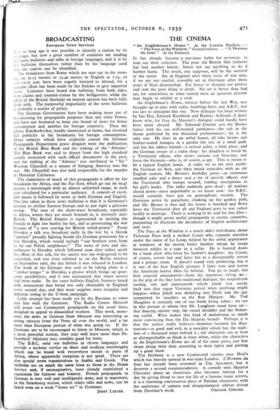BROADCASTING
European News Services \ r so long ago it was possible to identify a station by its auage, but now a great number of countries are sending o.: news bulletins and talks in foreign languages, and it is by bulletins themselves rather than by the language used it the station can be identified.
l'he broadcasts from Rome which are sent out in the even- on 31.15 metres or 25.40 metres in English at 7.15, ro 12.15 a.m. have been eagerly listened to abroad, for a effort has been made by the Italians to give impartial n.ws. Listeners have heard war bulletins from both sides, v. th claims and counter-claims by the belligerents, while the effect of the British blockade on neutral opinion has been fully dealt with. The purposeful impartiality of the news bulletins is probably a matter of policy.
The German Government have been making more use of
broadcasting for propaganda purposes than any other Power, and have not hesitated to keep one brand of news for home consumption and another for foreign countries. Thus the aflame Knickerbocker, hardly mentioned at home, has received full publicity in the broadcasts for foreign consumption. Other subjects which have evidently caused the German Propaganda Department grave disquiet were the publication of the British Blue Book and the sinking of the Athenia.' The Blue Book was said to depart from the high standard usually associated with such official documents in the past, and the sinking of the Athenia ' was attributed to " Sir " Winston Churchill as a means of bringing America into the war. Mr. Churchill was also held responsible for the murder
of Monsieur Calinescu.
The clumsiness of much of this propaganda is offset by the broadcasts for Africa, and the Far East, which go out on 19.47 metres, a wavelength with an almost unlimited range, in each case calculated for a particular audience. A concert of excel- lent music is followed by news in both German and English. The line taken in these news bulletins is that it is Germany's mission to civilise Eastern Europe and to put right a grievous wrong. The tone of the short-wave broadcasts, especially to Africa, where they are much listened to, is intensely anti- British. The British Empire is represented as inciting the French to fight her battles for her, and as prosecuting the war because of "a new craving for British world-power." From Slovakia a talk was broadcast early in the war by a Slovak "patriot," proudly fighting beside his German protectors for a free Slovakia, which would include "our brothers torn from us by our Polish neighbours." The news of riots and dis- turbances in Slovakia which followed soon after rather spoilt the effect of this talk, for the unrest was too widespread to be concealed, and was even referred to on the Berlin wireless on September 19th, the day before it was released in London. The work of the Gestapo was said to be taking place at a " starker tempo" in Slovakia, a phrase which brings up grue- some possibilities, and it was announced that many arrests had been made. In the same bulletin English listeners heard with amusement that bread was only obtainable in England every second day, and that meat supplies were irregular and deficient owing to the U-boat campaign.
Little attempt has been made yet by the Russians to come into line with the Germans. The Radio Centre Moscow still pours out Communist propaganda on the usual lines, designed to appeal to dissatisfied workers. This week, more- over, the news in German from Moscow was interesting as giving extracts from the Press all over the world, and a far more than European picture of what was going on. If the Germans are to be encouraged to listen to Moscow, which is a most powerful station, they may well learn more than Dr. Goebbels' Ministry may consider good for them.
The B.B.C. send out bulletins in eleven languages and provide a 20-hour service on short and medium wavelengths which can be heard well everywhere except in parts of Africa, where apparently reception is not good. There are also special news transmissions in Arabic and Greek. The bulletins are on much the same lines as those in the Home Service and, if tmimaginative, have already established a reputation for fairness and honesty. French propaganda in German is very well and intelligently done, and is important, as the Strasbourg station, which relays talks and news, can be heard even on a weak " home set " in Germany.
Parr LEEPER.


































 Previous page
Previous page